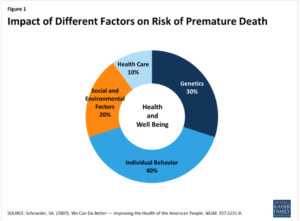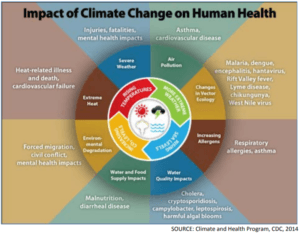The Impact of Climate Change on U.S. Health: Is Aetna Planning Appropriately?
Aetna and other major healthcare payers should wake up to the rising costs of climate change
Recent analysis of health outcomes in the U.S. has highlighted that factors outside of the traditional provision of health care – such as housing, education, employment, and access to healthy food – contribute heavily to the health equity of individuals and communities [1]. While the consideration of these factors, often referred to as the ¨social determinants of health¨, has been embraced by the payers of healthcare (namely, the U.S. government and private health insurers), one determinant has remained largely out of the focus of the payer community: the impact of climate change on population health.
However, an increase in climate-induced threats to health, such as vector-borne disease and temperature-related deaths, has encouraged government-sponsored research into the arena, and the findings suggest that the payer community should begin to think harder about the efforts they are taking to mitigate and adapt to climate change [2]. Aetna, one of the five largest private insurers in the U.S., has made small steps in the right direction but should consider more drastic measures to incorporate climate change in its comprehensive patient care protocols.
The Impact of Climate Change on U.S. Population Health
While many consider themselves insulated from climate change if they do not live in a coastal region prone to flooding or hurricanes, or an arid region subjected to fires, a 2016 publication by the U.S. National Science and Technology Council [2] explains that climate change driven by greenhouse gas emissions is presently having far reaching, and intense effects on U.S. public health, in a variety of ways, including:
- Disease carried by mosquitos, ticks and fleas, driven by volatile temperatures
- Increase and exacerbation of asthma from poor air quality
- Illness related from extreme temperatures
- Water and food contamination
- Consequences on mental health
Contributors to The Lancet, one of the world’s oldest and most highly regarded medical journals, warned that climate change can “undermine the last 50 years of gains in public health” [3]. These authors argue further that the impact is most dramatic on populations who are already at-risk: the low-income, the elderly or mothers and newborns [3]. From the perspective of a health plan like Aetna, these populations are the most expensive to care for today, and special attention should be paid to their vulnerability to environmental factors, which could amplify their risk profile and overall cost of care.
The Payer Response to Climate Change
It would seem logical for health plans to account for this risk in the way they reimburse patient care and interact with patients and providers. Unfortunately, a 2016 study conducted by sustainability non-profit Ceres Group on the quality and comprehensiveness of climate risk disclosures by insurers demonstrated that upon analysis of nearly 150 companies, ¨no health insurers´ disclosures indicated that they are holistically considering climate risk across their various business lines and in investments¨, and that health insurers performed the worst of all lines of insurance (including property & casualty and life) in terms of the quality of their disclosures, despite climate change ¨having significant public health impacts now, with worsening outcomes anticipated in the future, particularly if greenhouse gas emissions are not reduced¨ [4].
Aetna, one of the largest and most profitable U.S. health plans, has revealed its plans to combat climate change by committing to reducing its own internal greenhouse gas footprint, through activities such as decreasing emissions, saving water and energy, using renewable energy and recycling [5]. While these are admirable and undoubtedly significant near-term steps for a company with 50,000 employees, Aetna’s position does not indicate an appreciation for the urgency of this issue. I would expect and hope Aetna to publicly pronounce:
- Elevated standards for its network of providers related to environmental sustainability and communications with patients
- Engagement with providers to plan for risk mitigation in event of climate disasters
- Contribution to population-level research on impact of climate on health
- Sponsorship of lobbying efforts with the U.S. government (remarkably, the largest lobby of health plans in the U.S., AHIP, offers no articles on climate change in their online archive of policy research)
How Much is Enough?
Payers of healthcare like Aetna have a long list of initiatives they could tackle within the umbrella of the social determinants of health. How much should Aetna invest in this issue, relative to other important causes like education and employment? How should Aetna work with the other managed care plans in the U.S., who also wield heft from financial and advocacy perspectives? Would investors deem it appropriate for Aetna to channel resources into an issue they might have little control over? And while the answers to these questions may not be obvious, the impact of climate change on the health of Aetna´s members appears clearer each year as new records of temperature and greenhouse gas emissions are set (790 words).
[1] Harry Heiman and Samantha Artiga, “Beyond Health Care: The Role of Social Determinants in Promoting Health and Health Equity,” Kaiser Family Foundation, November 4, 2015, https://www.kff.org/disparities-policy/issue-brief/beyond-health-care-the-role-of-social-determinants-in-promoting-health-and-health-equity/, accessed November 2017.
[2] USGCRP, 2016: The Impacts of Climate Change on Human Health in the United States: A Scientific Assessment. Crimmins, A., J. Balbus, J.L. Gamble, C.B. Beard, J.E. Bell, D. Dodgen, R.J. Eisen, N. Fann, M.D. Hawkins, S.C. Herring, L. Jantarasami, D.M. Mills, S. Saha, M.C. Sarofim, J. Trtanj, and L. Ziska, Eds. U.S. Global Change Research Program, Washington, DC, 312 pp. http://dx.doi.org/10.7930/J0R49NQX. (Note: Recommended Citation)
[3] Nick Watts, et al, “The Lancet Countdown on health and climate change: from 25 years of inaction to a global transformation for public health,” The Lancet, October 30, 2017, http://www.thelancet.com/pdfs/journals/lancet/PIIS0140-6736(17)32464-9.pdf, accessed November 2017.
[4] Max Messery, “Insurer Climate Risk Disclosure Survey Report & Scorecard: 2016 Findings and Recommendations”, Ceres, October 2016, https://www.ceres.org/sites/default/files/reports/2017-03/Ceres%20Insurer%20Climate%20Risk%20Disclosure%20Survey.pdf, accessed November 2017.
[5] Aetna, “Aetna’s Commitment to a Healthy Environment,” https://www.aetna.com/about-us/corporate-responsibility/aetnas-commitment-healthy-environment.html, accessed November 2017.





The healthcare industry is a great and original space to evaluate the impact of climate change. You could possibly have elaborated on the fact that the first and most important consequence of climate change for everyone (those living in at-risk areas as well as the rest of the population) is the rising cost of insurance premiums.
Health insurances can be paid by several categories of people or entities: individuals, businesses (for their employees), etc.
I believe that the key for insurance companies like Aetna is to find solutions that are cheaper to implement than the current or expected cost impact of climate change on healthcare.
One example could be preventive care. For example, vaccination for water-borne diseases, air-purifiers, air-conditioning systems… Those systems/solutions could be dispatched to households affected by specific environmental conditions [1], [2].
In order to reduce the cost of those solutions, Aetna could possibly partner with large businesses who have high employee health benefit costs and share the burden with them. Everyone would benefit from such partnerships.
[1]: EPA, “Preventing Air Pollution-Related Cardiopulmonary Illnesses”, https://www.epa.gov/sites/production/files/2017-06/documents/env_health_workshopreport_final060717.pdf, Published September 2016
[2]: Kaiser Family Foundation, “Preventive Services Covered by Private Health Plans under the Affordable Care Act”, https://www.kff.org/health-reform/fact-sheet/preventive-services-covered-by-private-health-plans/, Published August 2015
Compelling post, John! I wonder if they should also commit to communicating their findings on population level research to their customers and to the wider public. It seems to me that there is a massive dearth of information on this in the wider public sphere. Whilst it is useful for researchers to communicate their findings to readers of the Lancet, the big problem I see is that the general public is largely unaware of this research. Awareness is growing but not as quickly as it should [1]. If the public do not understand the risks, it will never be a a priority for their public representatives. Clear, simple communication of the health risks of climate change from reputable sources such as health insurers could educate the public and potentially have more impact than Aetna lobbying the US government alone.
I agree with your assessment that investors will not want Aetna to shoulder the burden of climate change alone. Changing public opinion and pressuring government to make changes may be the most efficient uses of their efforts and money. I also think that once they have figured out a means of effective communication with the public and the government, they could use their platform to influence the public and the government on education, employment and the other social determinants of heath.
[1] http://news.gallup.com/poll/190010/concern-global-warming-eight-year-high.aspx
John, such an interesting and creative topic! I have honestly never thought about why climate change would matter to payers since I do not typically perceive them to be exceptional contributors to GHG emissions, as you noted. Unlike, say, a manufacturer of goods, Aetna and other payers will be adversely affected by climate change, but have little power to control it. For that reason, to your question, I doubt that investors will approve of lobbying dollars and other resources being directed to this in the face of higher priority societal and political issues.
Honestly, I am not sure this issue should be more important to Aetna than it is to any other player or individual in the economy, many of whom are adding to the problem. But, you are apt to bring up the fact that climate change will impact health, and to the extent to which Aetna’s influence on this issue encourages other players to take notice, I agree that they should speak up and attempt to drive change, at least in the healthcare system. For example could Aetna incentive drug manufacturers to adopt sustainable practices or providers to incorporate sustainability targets by tying those actions to access / reimbursement? If not, feels like Aetna will be in the same camp as many small / low-lying nations: hurt.
This is an amazing article, John. The optimist in me would also like to believe that Aetna is sufficiently incentivized to publicly acknowledge climate change and the impact on their business. As the healthcare insurer of nearly 47 million people in the US, it makes sense that increasing volatility in weather patterns, air pollution, increasing allergens would all have a significant impact on Aetna’s bottom line [1]. The fact that neither they nor any other insurer discloses a consideration of climate change risks begs two questions.
1. Is Aetna currently feeling the financial impacts of climate change? I would think no for two reasons. First, because it is difficult to suss out the effect of climate change on health from all other factors. Without having much familiarity with actuarial models involved in the calculation of healthcare premia or mortality triangles, I would imagine that Aetna is more focused on variables such as increasing rates of obesity, access to fresh foods, area of residence and other more clearly observable factors than climate change. Second, perhaps because the groups immediately impacted by climate change do not reside in the US. Rather, they are the communities around the forests that are razed, or the families who live closest to refineries and processing plants.
2. What benefit would Aetna expect from publicly acknowledging climate change? Unfortunately, very little. Scott Pruitt, head of the Environmental Protection Agency, has consistently denied that carbon dioxide causes global warming [2]. What hope does an insurer have of convincing an already recalcitrant administration of the secondary and tertiary impacts of climate change if the fundamental idea is already being questioned.
[1] https://www.aetna.com/about-us/aetna-facts-and-subsidiaries.html
[2] https://www.theguardian.com/environment/2017/mar/09/epa-scott-pruitt-carbon-dioxide-global-warming-climate-change